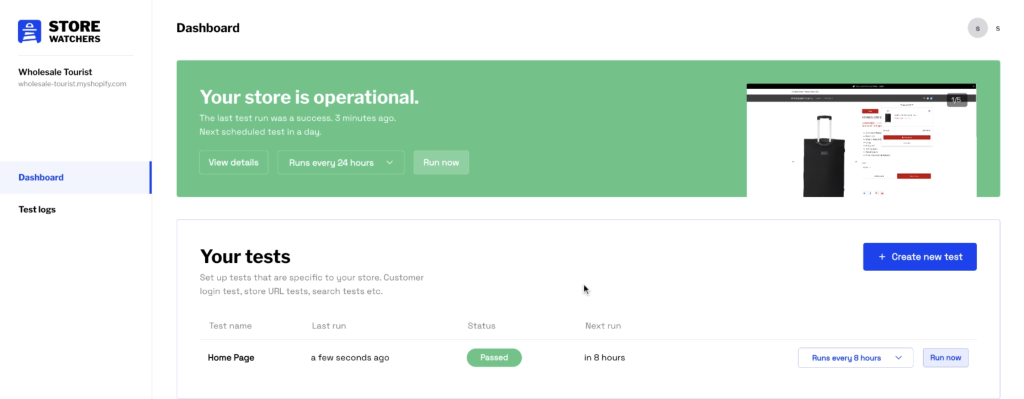For customers purchasing goods from their favorite online stores, brand value and dependability are must-haves. Thus, it is up to the e-commerce store owner to guarantee that all facets of his/her business remain operational at all times. This can be accomplished through automated website testing processes which greatly benefit businesses in numerous ways such as uncovering errors or issues quickly while also cutting back on costs associated with manual efforts for conducting tests.
You cannot test your store every 4, 12 or 24 hours, this is where automation comes in. Today’s e-commerce stores are using an automated website testing solution to detect and identify potential issues in their e-commerce stores before they become serious problems. Also, when set up correctly, automated testing is less prone to errors than human efforts.
- What are the challenges e-commerce stores face while testing their stores?
- What is automated testing?
- Types of automated website testing for e-commerce store
- 7 Reasons why e-commerce stores need Automated Testing?
- What is the best way for an e-commerce store owner to start with automated testing?
- Summing Up…
In this article, we will explore 7 persuasive reasons why e-commerce stores need automated testing and the steps they should take to get started. Before delving into these points of view, let’s first examine the challenges that e-commerce businesses must overcome in order to properly test their store.

What are the challenges e-commerce stores face while testing their stores?
E-commerce stores face various challenges while testing their stores. These include:
- High cost of manual testing and resources,
- Maintaining the accuracy and speed of the tests,
- Finding and fixing bugs in a timely manner,
- Achieving high customer satisfaction by delivering quality products/services.
These are some key challenges that e-commerce store owners face when it comes to testing their online stores. Automated testing can help address all these challenges effectively.
What is automated testing?
Automated testing is a process that uses specialized automated tools to execute tests and compare the actual results with the expected ones.
Types of automated website testing for e-commerce store
There are several types of automated testing that can be used for e-commerce stores such as:
- Functional Testing: Functional testing is a type of software testing that helps tests to discover errors and issues in the functionalities of an application/store after carrying out actionable test cases for each function.
- Unit Testing: Unit testing is carried out during the development of an application where individual components of the application are tested to verify their functionality.
- Integration Testing: Integration testing is done to test two or more that two applications/systems are successfully integrated with each other – in a such way that the technical communication/transfer between them is working as expected.
- Performance Testing: Performance testing is a type of testing performed on websites and apps to check their performance under different load conditions and usage scenarios. It helps improve user experience in your store. According to a report by Amazon, every 100 milliseconds added in page load time costs 1% of revenue to e-commerce stores. This is why performance testing is also critical.
Automated tests can be used to test applications, web-based systems, mobile apps, etc., simultaneously or in parallel. Also, automated tests help e-commerce store owners in many ways.

7 Reasons why e-commerce stores need Automated Testing?
Automated testing makes it easier for businesses to detect any technical issues quickly so that these can be addressed before they become bigger problems. Though there are more reasons to implement an automated testing solution for your e-commerce store, here’s why:
1. Increased efficiency and faster test cycles
Automated testing allows store owners/testers to execute multiple tests simultaneously, thus saving their time with improved efficiency of carrying out each test in a structured and speedy way. Automating your testing further helps in carrying out tests on a periodic basis.

2. Easy maintenance
Automated testing solutions like Store Watchers allow for changes in existing tests that can be implemented easily without having to write new code each time. This makes it easier for developers and testers to maintain their test scripts over time and minimize the efforts of writing a new code manually to carry out each new test.
Unlike manual testing, the automated testing solution offers 24x7x365 availability to run continuously in the background and find potential issues.
3. Improved accuracy
Manual testing of your ecommerce store could be prone to any mistake done by your tester or the person who is testing your store. And this might lead to misleading or false test results.

Automated testing reduces the errors in the process of testing and actually offers you far more accurate test results, as it eliminates the human element from the equation.
4. Reduced costs
Since automated tests do not require manual labor and can be run multiple times at once, they help to reduce operational costs significantly.
5. Increased test coverage
Automated testing provides a much larger scope of test coverage compared to manual testing by executing multiple tests in different scenarios quickly and accurately. This helps e-commerce businesses detect bugs that manual testers may miss out on.
6. Improved customer experience
With an automated system that is constantly running tests to identify any existing or potential issues, you or your developers can fix them on the say so that your customers are assured of a better user experience overall when using your e-commerce store for their purchases.
7. Increased scalability
Automated testing is not only limited to web applications and can be used for other types of applications as well, such as mobile apps. This makes it easier for e-commerce businesses to scale up their automated testing processes with minimal effort.
Overall, automated testing helps e-commerce stores improve the quality of their store, save time and money and increase customer satisfaction. It should be an essential part of every e-commerce store’s testing process if they want to stay ahead of the competition.
What is the best way for an e-commerce store owner to start with automated testing?
You can take the following steps that will help you with starting automated testing for your e-commerce store:
#Step 1
The store owner should identify and document which areas or features of his/her online store need testing.
#Step 2
After that, he/she needs to decide on the type of tests that will be used and select the appropriate tools and frameworks for executing the tests.
#Step3
The automated tests should be designed based on the store’s requirements and executed regularly to ensure functionality is maintained at all times.

Summing Up…
In a fast-paced, online world it is important for e-commerce stores to keep up with the competition. Automated testing can help you do that by allowing your team to quickly test your existing and latest changes in your store and make sure the functionality of the entire store is working as expected.
This ensures that your store is always running at its best and that customers have a positive experience. If you are not already using an automated testing solution to test your store and find issues, now is the time to start. Your competitors are probably already doing it and if you don’t want to be left behind, you need to catch up.





